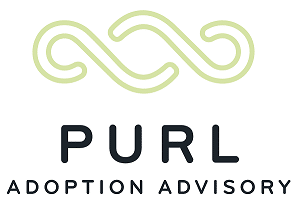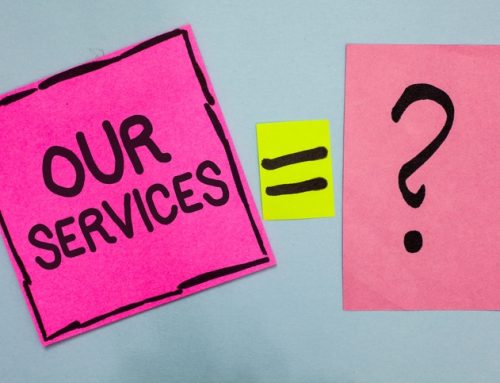
Words matter because words can hurt.
Most people who use negative adoption terminology have no idea that what they are saying could be insensitive or hurtful, and instead these comments or questions are used due to ignorance, curiosity and interest in adoption and the adoption process. But during this National Adoption Awareness Month, we are trying to educate on all aspects of adoption, and that includes the best way to communicate about adoption. So here is a short discussion on some of the negative adoption language used frequently, why/how it is considered negative and a better alternative to use in conversation.
Real Parent vs. Birth Parent: When people ask an adoptee (an adopted child) or an adoptive parent about the circumstances of their adoption, or about the child’s birth family, they often use the term “real parent” (for example, “Where are your “real parents”?, or “What do you know about her “real parents’”?. This can be a sore point for members of the adoption triad (adoptees, birth parents and adoptive parents). There is nothing “fake” about an adoptive parent to a child through adoption. Both the biological (otherwise known as birth) parents and the adoptive parents are REAL parents to this child, the adoptive parents are making the same ongoing child-rearing decisions as parents to biological children, and the birth parent carried that child and typically made the difficult choice to make an adoption plan and to choose the adoptive parents they felt was best suited to raise their child. Please consider using “biological parent” or “birth parent” when referring to an adoptee’s birth family. However, this term is usually used by friends and family who are questioning or are curious about an adoptee’s background. You should be aware that information about the birth family and the circumstances surrounding why the birth family made the adoption plan for their child, is typically considered private and is likely protected by the adoptive parents, for the sake of their child. So, don’t be surprised if an adoptive parent does not respond with much information in response to these types of questions. The circumstances about an adoption is best shared by a child through adoption when they are ready to tell their own adoption story. For more on this topic, check out this blog post.
Put Up/Give Up vs. Place for Adoption (or Make An Adoption Plan): When discussing adoption, the term “put up for adoption” is often used. I know it was a phrase I used myself before I understood its disturbing origination. This term originated from the Orphan Train Movement of the mid 1800’s, when homeless children from big cities were taken to smaller farming communities and were literally “put up” on stage for landowners to select to “adopt”, but just to use as field hands. The term “give up” or “give away” is often used as well and is also negative to those in the adoption triad. This term implies that a birth family is “giving up” or giving away” their child without much thought. In fact, birth parents undergo an intense emotional experience when making an adoption plan and typically take great care in selecting adoptive parents for their child. Moreover, the phrase “giving up” is typically associated with bad things or destructive habits instead of referring to a child (for example, she “gave up drinking/gambling/smoking.”. A better alternative is to say that the birth family “placed their child for adoption” or “made an adoption plan for their child.”
Birth parent vs. Expectant parent: It is important to understand when someone actually becomes a “birth parent” as that term is typically used in the context of adoption. An “expectant mom” in an adoption setting is a pregnant woman or a woman who has given birth who is considering an adoption plan for her child., whereas a birth mom is someone that has already signed consents to an adoption. Until a woman signs consents to an adoption, she is the ONLY mom to that child, and while she might have chosen possible adoptive parents for her child and allowed them to walk along side her through her pregnancy and delivery, they do not yet have any rights or entitlement to that child. It is her decision whether or not she chooses to parent, and even though it might be heartbreaking for those hopeful adoptive parents if that woman chooses to parent, it just means that child was not meant for their family. Birth parents are typically making difficult decisions about adoption twice, once when they choose a family, and once when they sign the consents relating to the adoption. It can be seen as a form of coercion to use the term “birth parent” before they have made a final decision on the adoption, as it implies they don’t have the choice to parent the child.
Adding the Term “Adopted” or “Adoptive” In Everyday Language: In this post, I have used “adoptee” or “adoptive parent” as a way to describe the different parties in the adoption process. However, in normal, everyday conversation, I do not refer to my daughter Cora (my daughter through adoption) as my “adoptive daughter”, just like I don’t refer to my daughter Raelyn as my “biological daughter”. I also don’t refer to myself as Cora’s “adoptive mom”. I’m just her mom, and she’s just my daughter. Please drop the use of “adopted” in everyday conversation, unless it is necessary in the context of the conversation. Even then, keep in mind that a child’s adoption story is typically only their story to tell. A child through adoption may not be old enough to yet tell their story or they many not want everyone in that context to know they were adopted, so referring to them in that manner is actually sharing a part of their adoption story.
We hope this explanation helps you scratch the surface surrounding the negative adoption language often used in the adoption context. We encourage all families that are hoping to add to their family through adoption take time and effort to educate themselves about all aspects of adoption, including positive adoption terminology, and to also educate their friends and families who will be a necessary support to them in this journey. We encourage hopeful adoptive parents to tell their friends and family about the amazing adoption resources in our community, from every perspective, that we can all learn from.

Words matter because words can hurt.
Most people who use negative adoption terminology have no idea that what they are saying could be insensitive or hurtful, and instead these comments or questions are used due to ignorance, curiosity and interest in adoption and the adoption process. But during this National Adoption Awareness Month, we are trying to educate on all aspects of adoption, and that includes the best way to communicate about adoption. So here is a short discussion on some of the negative adoption language used frequently, why/how it is considered negative and a better alternative to use in conversation.
Real Parent vs. Birth Parent: When people ask an adoptee (an adopted child) or an adoptive parent about the circumstances of their adoption, or about the child’s birth family, they often use the term “real parent” (for example, “Where are your “real parents”?, or “What do you know about her “real parents’”?. This can be a sore point for members of the adoption triad (adoptees, birth parents and adoptive parents). There is nothing “fake” about an adoptive parent to a child through adoption. Both the biological (otherwise known as birth) parents and the adoptive parents are REAL parents to this child, the adoptive parents are making the same ongoing child-rearing decisions as parents to biological children, and the birth parent carried that child and typically made the difficult choice to make an adoption plan and to choose the adoptive parents they felt was best suited to raise their child. Please consider using “biological parent” or “birth parent” when referring to an adoptee’s birth family. However, this term is usually used by friends and family who are questioning or are curious about an adoptee’s background. You should be aware that information about the birth family and the circumstances surrounding why the birth family made the adoption plan for their child, is typically considered private and is likely protected by the adoptive parents, for the sake of their child. So, don’t be surprised if an adoptive parent does not respond with much information in response to these types of questions. The circumstances about an adoption is best shared by a child through adoption when they are ready to tell their own adoption story. For more on this topic, check out this blog post.
Put Up/Give Up vs. Place for Adoption (or Make An Adoption Plan): When discussing adoption, the term “put up for adoption” is often used. I know it was a phrase I used myself before I understood its disturbing origination. This term originated from the Orphan Train Movement of the mid 1800’s, when homeless children from big cities were taken to smaller farming communities and were literally “put up” on stage for landowners to select to “adopt”, but just to use as field hands. The term “give up” or “give away” is often used as well and is also negative to those in the adoption triad. This term implies that a birth family is “giving up” or giving away” their child without much thought. In fact, birth parents undergo an intense emotional experience when making an adoption plan and typically take great care in selecting adoptive parents for their child. Moreover, the phrase “giving up” is typically associated with bad things or destructive habits instead of referring to a child (for example, she “gave up drinking/gambling/smoking.”. A better alternative is to say that the birth family “placed their child for adoption” or “made an adoption plan for their child.”
Birth parent vs. Expectant parent: It is important to understand when someone actually becomes a “birth parent” as that term is typically used in the context of adoption. An “expectant mom” in an adoption setting is a pregnant woman or a woman who has given birth who is considering an adoption plan for her child., whereas a birth mom is someone that has already signed consents to an adoption. Until a woman signs consents to an adoption, she is the ONLY mom to that child, and while she might have chosen possible adoptive parents for her child and allowed them to walk along side her through her pregnancy and delivery, they do not yet have any rights or entitlement to that child. It is her decision whether or not she chooses to parent, and even though it might be heartbreaking for those hopeful adoptive parents if that woman chooses to parent, it just means that child was not meant for their family. Birth parents are typically making difficult decisions about adoption twice, once when they choose a family, and once when they sign the consents relating to the adoption. It can be seen as a form of coercion to use the term “birth parent” before they have made a final decision on the adoption, as it implies they don’t have the choice to parent the child.
Adding the Term “Adopted” or “Adoptive” In Everyday Language: In this post, I have used “adoptee” or “adoptive parent” as a way to describe the different parties in the adoption process. However, in normal, everyday conversation, I do not refer to my daughter Cora (my daughter through adoption) as my “adoptive daughter”, just like I don’t refer to my daughter Raelyn as my “biological daughter”. I also don’t refer to myself as Cora’s “adoptive mom”. I’m just her mom, and she’s just my daughter. Please drop the use of “adopted” in everyday conversation, unless it is necessary in the context of the conversation. Even then, keep in mind that a child’s adoption story is typically only their story to tell. A child through adoption may not be old enough to yet tell their story or they many not want everyone in that context to know they were adopted, so referring to them in that manner is actually sharing a part of their adoption story.
We hope this explanation helps you scratch the surface surrounding the negative adoption language often used in the adoption context. We encourage all families that are hoping to add to their family through adoption take time and effort to educate themselves about all aspects of adoption, including positive adoption terminology, and to also educate their friends and families who will be a necessary support to them in this journey. We encourage hopeful adoptive parents to tell their friends and family about the amazing adoption resources in our community, from every perspective, that we can all learn from.



